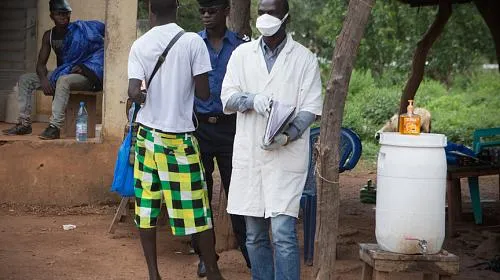Since the deadly Ebola outbreak in West Africa, over 3,800 people have died, and more than 8,000 cases have been reported according to the World Health Organization. The Centers for Disease Control warns that if the virus is not contained, there could be as many as 1.4 million people infected with Ebola by January 2015.
“We are fighting an invisible enemy, and as a developing country just emerging from years in civil war, we can’t get enough help right now to stop this virus,” said Alfred Makavore, CARE Technical Health Advisor in Sierra Leone.
One of the most critical ways to prevent infection is through proper hygiene, so CARE will be ramping up the next phase of its prevention efforts in Sierra Leone and Liberia to distribute soap, water buckets, gloves and chlorine; as well as demonstrating proper hand washing techniques.
“I have chlorine water and soap with me at all times, and am constantly washing my hands. I don’t shake people’s hands, and no one is allowed to enter my home without washing their hands. These are the type of preventative measures we will be encouraging others to take as well,” said Emmanuel Wilson, Procurement Officer at CARE in Liberia. “Outside every public building there are hand washing stations, and CARE staff will be helping with the distribution of hygiene materials so that eventually there will be hand washing stations outside every household as well.”
As the deadly outbreak rages on, people’s lives are at a standstill, as many are living in fear as voluntary prisoners to their homes. Children are not attending school. People’s livelihoods have been disrupted, as they can’t move about freely to buy and sell goods in the market. The impacts of Ebola are felt by everyone in some way, and CARE is concerned about the long-term consequences the virus will have on the lives of the poor, vulnerable people who may never become infected.
“It is so frightening to watch people dying of this virus. I have a friend who recently died of Ebola and two weeks later his wife also died, and now their three-year-old son is an orphan,” said Andrew Katta, a CARE program officer in Makini, which is a community in northern Sierra Leone currently under mandatory quarantine. “Sadly, I do not know what happened to their son, because I could not go to their home to pay the traditional respects for fear of contracting the virus.”
Another important message of prevention is eliminating some traditional beliefs and practices, such as treating corpses for burial and attending funerals, as corpses are highly infectious.
These important prevention activities and hygiene promotion are critical to stopping the spread of Ebola. CARE will be conducting these activities in Sierra Leone and Liberia, including in two refugee camps where over 20,000 refugees are residing in conditions where the disease could spread quickly if an outbreak occurs.
CARE is committed to working with partners and the government to stop this deadly virus, and has already used its relationships in communities across Sierra Leone and Liberia to help educate the public on reducing transmission risk through proper hygiene. In Sierra Leone, CARE distributed 1,650 informational posters about Ebola prevention in the districts of Kambia, Tonkolili, Bombali and Koinadugu.

